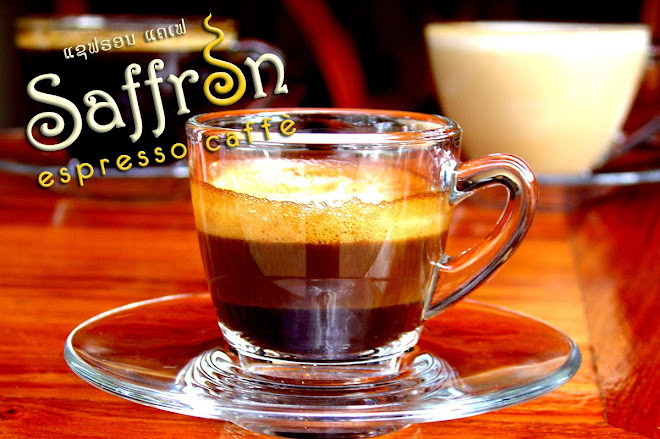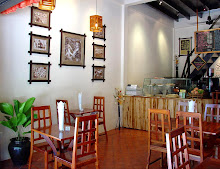LUANG PRABANG, LAOS (LP) - While many people in the West have not even heard of the country of Laos, even fewer have heard of Lao coffee. But this is beginning to change in the charming city of Luang Prabang, the former Royal capital of Laos. Tourists are flocking here to see "the best preserved city" in Southeast Asia and to try one of the best brewed coffees in the region. While saffron-robed Buddhist monks make their rounds early in the morning along the streets of this ancient UNESCO World Heritage site, enchanted travelers are sipping on Saffron Coffee along the banks of the Mekong.
"Saffron Coffee was begun as an initiative to help former growers of opium who live high in the mountains of northern Laos," says David Dale, the founder and President of Saffron Coffee Company--the first coffee company in northern Laos. "Laos has always been known for 'The Golden Triangle' and the opium it produced. But when the government started to effectively put an end to opium production, upland farmers had little choice but to succumb to poverty."
Indeed, Laos is one of the poorest countries in the world with the average per capita income of around $800 according to the US Department of State website. Ravaged by the "Secret War" and a restrictive economic policy, Laos wallowed in extreme poverty after the Vietnam War up until the 1990s. Now that the Lao government has embraced a free enterprise system, the country has seen steady economic growth. New replacement crops like coffee are helping to make a difference.
"I'm excited about the difference Saffron Coffee is making with former growers of opium, and so are the tourists who are increasingly aware of social issues," explains Dale. "But I am just as excited about the quality of coffee these farmers are able to produce. We are intent on pursuing Fair Trade certification and operate according to Fair Trade principles; however Saffron Coffee has proven to be so good that it doesn’t need to depend on Fair Trade to help sell it.”
Coffees from around the world that are sold under the “Fair Trade” label guarantee a fair minimum price paid to the producers for their coffee. The concept is to move more of the profit margin in the direction of the producers who often receive only a small fraction of the profits made by others on the coffee they produce. Many coffees of inferior quality, however, have obtained Fair Trade certification and are then able to market their coffee at a much higher price than they could normally command. Consequently, to many coffee connoisseurs, Fair Trade coffee has almost become synonymous with inferior tasting coffee.
Customers at the Saffron Espresso Caffè in Luang Prabang, a coffee shop owned and managed by Dale’s Lao wife Malivanh, are pleasantly surprised when they try Saffron Coffee for the first time. “I’ve been to Laos several times and have never had a good cup of coffee. I was surprised, then, when I stumbled upon Saffron’s café and tried their coffee. It is delicious! I’ve finally found my morning home in Laos,” related one tourist from Australia.
Mike, a Bangkok resident who visits Luang Prabang regularly is also rather fond of Saffron Coffee. “My only problem is that they don’t carry enough bags of their roasted beans in their shop. Every time I come here I buy them out!”
A prominent author of several books on coffee and world renowned coffee cupper (evaluator) described Saffron Coffee as having a “deep sweet-toned aroma with notes of cedar and dark chocolate. Rich body. Light syrupy texture. Gentle acidity. Rich flavor with notes of dark chocolate and hints of molasses.”
The secret to Saffron’s coffee is in its unique habitat for cultivation and in the high standards of processing. Saffron Coffee’ website, www.SaffronCoffee.com, explains. “Cool air at the high elevations and rich forest soil combine with the distinctive care of each hilltribe to make these mountain estates one of the most exceptional coffee growing regions in the world.” Dale reports that the coffee Saffron Coffee promotes to and purchases from the farmers is all Arabica coffee, a species of coffee that is known for its rich flavor and superiority over Robusta—the species of coffee that is more commonly grown in southern Laos and Vietnam. Furthermore, Saffron Coffee is fully washed, shade-grown and organic coffee.
“Luang Prabang is quickly becoming the favorite destination of tourists visiting Southeast Asia. It is a serene and enchanted city set in the mountains of northern Laos that inspires visitors visually and spiritually. We like to believe that as we roast Saffron Coffee we capture all the essence and allure of this ancient city into the beans. When you smell the deep aroma of freshly roasted and freshly brewed Saffron Coffee, and when you taste the deep, rich flavor, you will be inspired with the serenity of this special place.”
Saffron Coffee can be purchased in 250 gram bags at the Saffron Espresso Caffè in Luang Prabang, or ordered online through their website (www.SaffronCoffee.com) in twelve ounce bags (340 g). Other quantities of coffee can be ordered directly from Saffron Coffee Company by e-mailing Info@SaffronCoffee.com.
Tuesday, July 6, 2010
Subscribe to:
Posts (Atom)










